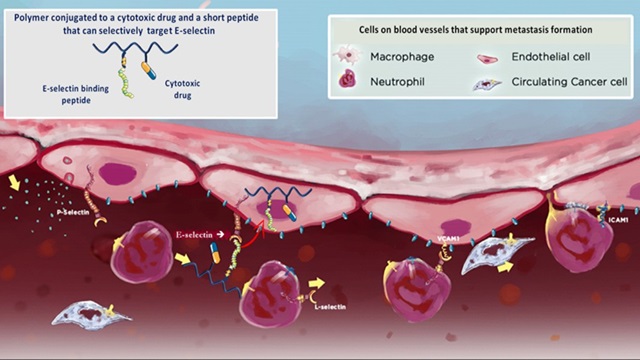
Illustration of the polymer in the bloodstream and its binding to E-selectin, which is expressed exclusively on cells lining the walls of blood vessels in areas of liver metastases. Once bound, the polymer enters the cells and releases a toxic drug and impairs the blood supply to metastases.( Credit: Nenad Milošević BGU)
Israeli scientists have made yet another cancer treatment breakthrough, this time using nanosized polymers. Researchers from Ben Gurion University say they developed a way to selectively deliver chemotherapeutic drugs to blood vessels that feed tumors and metastases.
The polymer eliminates colorectal cancer liver metastases and prolongs mice survival, after a single dose-therapy, they said. The findings were published in Nano Today, a leading journal in the field of nanotechnology.
A nanosized polymer is a polymer that has been engineered to have dimensions in the nanometer range. By comparison, a human hair is about 80,000-100,000 nanometers wide. These tiny particles offer unique properties that make them desirable for a wide range of applications.
Will you offer us a hand? Every gift, regardless of size, fuels our future.
Your critical contribution enables us to maintain our independence from shareholders or wealthy owners, allowing us to keep up reporting without bias. It means we can continue to make Jewish Business News available to everyone.
You can support us for as little as $1 via PayPal at office@jewishbusinessnews.com.
Thank you.
Because of their small size, nanosized polymers have a very large surface area. This large surface area can be beneficial for applications such as drug delivery, where the polymer can be used to carry drugs to specific targets in the body. The large surface area can also be used to create strong and lightweight composite materials.
Nanosized polymers can be made from a variety of different materials, including plastics, metals, and ceramics. They can be synthesized using a variety of different techniques, including chemical synthesis, physical synthesis, and biological synthesis.
Colorectal cancer is a type of cancer that starts in the colon or rectum, which are parts of the large intestine. It’s also sometimes called bowel cancer or rectal cancer.
is the third most diagnosed cancer, and the third most common cause of cancer-related death in both men and women in the United States. The liver is the most common site for CRC metastasis, with around 70% of patients ultimately developing liver metastases. Treatment options for metastatic disease are scarce, and while surgery remains the gold standard, many patients need additional therapies (chemotherapy, targeted- or immune-therapy) for a curative-intended treatment.
Targeted therapies and immunotherapies directed against specific features of the tumor have emerged as promising therapeutic strategies for cancer patients, but their efficacy is often limited by the large variety of mutation profiles of CRC tumors, many of them conferring resistance to specific treatments.
Prof. Ayelet David and her research team developed a tiny polymer (2-5 nanometer in size) for delivering chemotherapeutic drugs into endothelial cells at the inner lining of blood vessels that support tumor growth. The polymer carries a targeting peptide that binds to the adhesive molecule E-selectin, which is expressed exclusively on endothelial cells of new blood vessels that are created to feed growing tumors, and thus can deliver drugs selectively to tumors and metastatic sites. Once the polymer binds and enters the endothelial cells, it releases the toxic drug, thereby damaging the blood supply to growing tumors and metastases. Since the polymer is much larger in size than conventional chemotherapeutic molecules, it cannot leak from blood vessels to reach other healthy tissues, and thus significantly reduces the risk of side effects of chemotherapy drugs.
“Colon cancer is a very aggressive tumor and spreads very quickly to the liver. About 25% of the patients with CRC present liver metastases at the time of diagnosis,” Prof. David explained. “The available personalized treatments may prolong survival and improve quality of life for many patients with metastatic disease, although a cure is rare, and recurrence is expected. Our unique polymer demonstrates promising preclinical results for treating advanced cancer that has spread to other places in the body and usually cannot be cured or controlled with other therapies.”
She went on to add that their findings support the results of their previous studies, showing that a single dose treatment cures half of the mice with established melanoma lung metastases and that the therapy does not require a pre-treatment assessment for gene mutations in tumors to achieve favorable clinical outcomes.



